Europe
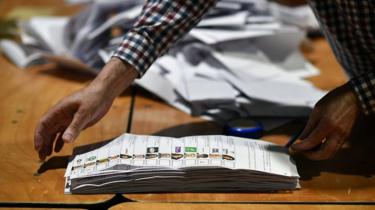 GETTY IMAGES
GETTY IMAGES
More than half of the seats at stake in the Irish general election have been filled, following what has been a historic result for Sinn Féin.
The outcome was described as "something of a revolution in the ballot box" by the party's leader Mary Lou McDonald.
With all first preferences counted, the left-wing republican party has taken 24.5% of the vote, compared to 22% for Fianna Fáil and 21% for Fine Gael.
No one party will win enough seats for an outright majority.
Almost 100 of the 160 seats have been declared, but negotiations to establish a government could be prolonged.
Before the election, both Fine Gael and Fianna Fáil had ruled out forging a coalition with left-wing republican party Sinn Féin, citing its tax policies and IRA past as deterrents.
On Sunday evening, taoiseach (Irish PM) and Fine Gael leader Leo Varadkar conceded it would be "challenging" to form a government.
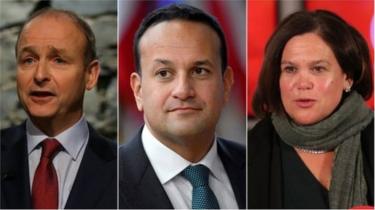
Fianna Fáil leader Micheál Martin did not rule out working with Sinn Féin, but said "significant incompatibilities" still existed.
Sinn Féin President Mary Lou McDonald said she was exploring options to see if it would be possible to form a government without either Fine Gael or Fianna Fáil.
- LIVE: Irish election results and analysis day two
- Who is Mary Lou McDonald?
- Profile of Ireland's political parties
Ms McDonald, who topped the poll in her four-seat Dublin Central constituency, said: "The frustration people have felt for a long time with the two-party system, whereby Fine Gael and Fianna Fáil handed the baton of power between each other - that's now over," she said.
"This vote for Sinn Féin is for Sinn Féin to be in government… for Sinn Féin to deliver," she told RTÉ's Morning Ireland programme on Monday,
"My first job of work, and I commenced this yesterday, is to establish with other parties whether or not there are the numbers to deliver a government without Fianna Fáil or Fine Gael."
Her party's vice-president, Michelle O'Neill, said Sinn Féin would have "asks in terms of the republican project", in line with its repeated calls for the next government to prepare for Irish unity.
Outgoing Irish finance minister and Fine Gael TD Paschal Donohoe said his party was likely to have "some form of engagement" with Sinn Féin, but said the two parties would not be going into government together.

'A seismic break for two-party system'
By Chris Page, BBC News Ireland Correspondent
"Seismic", "historic", "momentous" - those are the sorts of words which are being used to describe the results in the Irish general election.
Of course, those superlatives are being spoken by Sinn Féin politicians and activists to describe their party's surge.
But they are also coming from the lips and pens of political analysts, as they assess how Mary Lou McDonald's party has loosened the decades-long grip of the two parties which have dominated Irish governments.
What some commentators are terming "coalitionology" will be a popular pastime as the count continues over Monday, and perhaps beyond.
The proportional representation system of voting means finalising the seat tally is complex.
Given so many Sinn Féin candidates were elected on the first count - and did not have running mates - their surpluses will be very much in play to decide where the other seats in their constituencies go.

Why the Sinn Féin surge?
Left-leaning Sinn Féin managed to successfully tap into the public anger felt in the Republic of Ireland over issues that have dogged centre-right Fine Gael for a number of years - a shortage of housing, rocketing rents and homelessness, analysts suggest.
That is despite the fact the country is forecast to have one of the fastest growing economies in the EU in 2020.
They were dubbed "the problems of success" by former Finance Minister Michael Noonan as far back as 2015.
Brexit - a considerable focus of Leo Varadkar and his deputy Simon Coveney while in power - barely registered as an issue in the campaign.
Democratic Unionist Party (DUP) leader Arlene Foster, whose party is in a power-sharing government with Sinn Féin in Northern Ireland, said younger voters had backed Sinn Féin as a "protest vote".
"From a Northern Ireland perspective we will have to work with whoever the government is in the Republic of Ireland," Mrs Foster told BBC Radio Ulster's Good Morning Ulster programme.
She also questioned whether Sinn Féin would have their focus on Northern Ireland questioned, in the way there had been a "wailing and gnashing of teeth" over her party's confidence-and-supply agreement with the previous Conservative government in the UK.
Rise in seats
Sinn Féin is on course to dramatically increase how many seats it holds after it won the most first preference votes, topping the poll in 30 of the 39 constituencies.
Following the last election in 2016 Sinn Féin had 23 seats in the Dáil (Irish parliament).
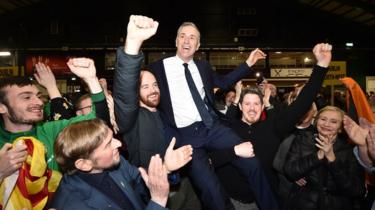 CHARLES MCQUILLAN
CHARLES MCQUILLAN
Fine Gael has been in government since 2011, firstly with the Labour Party and then with independents and since 2016, a confidence-and-supply deal with Fianna Fáil.
It looks set to lose seats for the second election in a row, but that does not necessarily rule it out of forming another government.
Its share of first preference votes dropped from 25.5% at the last election to 20.9%.
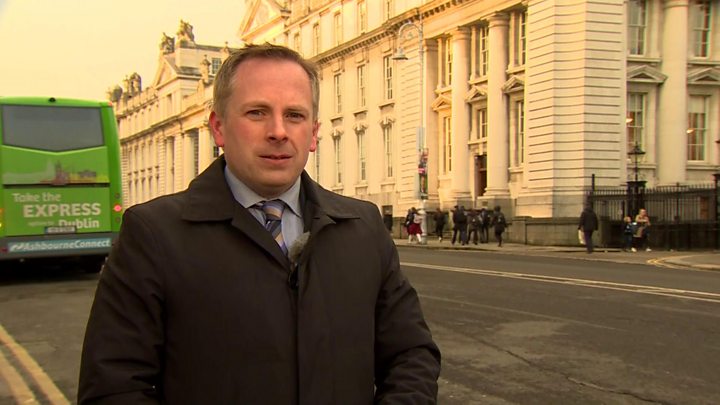
The taoiseach said he was "not really" disappointed that he did not top the poll in his own constituency. He did get an increase in his votes compared to the last election.
He added it was now clear there was now a "three-party system".
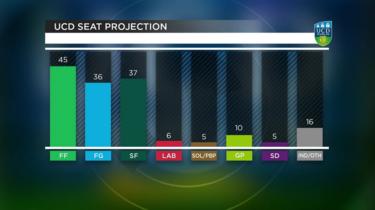 UCD/ RTÉ
UCD/ RTÉ
On Sunday Micheál Martin said reports suggested his party "would be the largest" but that it was early days.
He said the most important thing when forming a government was "compatibility in the programme for government" and that formation of a government was going to be very difficult.
Mr Martin added he was a "democrat" and respected the will of the people.
What about the smaller parties?
The Green Party is also set to increase the number of seats it holds.
Green leader Eamon Ryan, who was elected on the first count for Dublin Bay South, said his party would play its part in talks to form a government.
The Green Party secured 7.1% of first preference votes, followed by Labour (4.4%), Social Democrats (2.9%), Solidarity-People Before Profit (2.6%).
Aontú (1.9%) independents (12.2%) and others (1.3%) accounted for the rest.
BBC

.jpeg)
.jpeg)
0 Comments